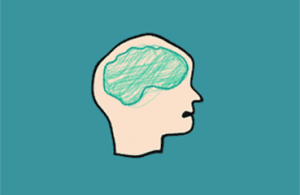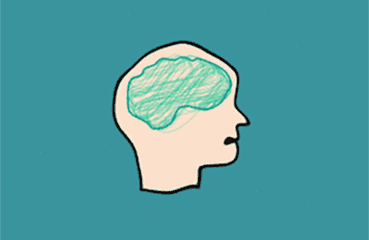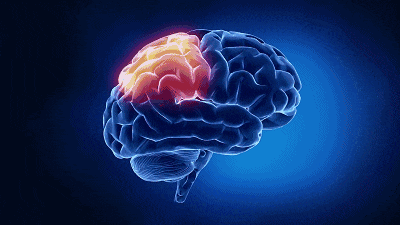
The brain likes the “commander-in-chief” of the human body, arranging the functions of the body orderly to operate normally.

People always blame “advanced age” for insufficient brains and poor memory. A recent study by Spanish scientists has shown that Your memory may be affected by an unexpected cause — obesity.
Fat people may have worse memory
Researchers from the University of Girona in Spain and the University of Pompei Fabra jointly published their research results in Cell Metabolism and found that obesity can affect the composition of intestinal microbes and the metabolism of some aromatic amino acids (AAA), which Lead to a decline in short-term and working memory [1].

The researchers recruited 116 middle-aged subjects (65 were obese and 51 were not obese), used speech learning to test their cognitive abilities, and analyzed the correlation with the subjects’ gut microbes. The volume of different brain regions involved in speech and working memory was evaluated.
Researchers have found that different intestinal flora is correlated with cognitive ability and the volume of specific brain regions. In addition to microbial composition, some compounds produced by the flora related to the metabolism of aromatic amino acids (AAA), such as riboflavin, folic acid, vitamin B12, etc., are also related to memory.
Later, the researchers discovered that AAA (tryptophan, tyrosine and phenylalanine) and its catabolites in plasma and feces are related to memory ability. Obesity will affect the metabolism of intestinal microbes on AAAs, and then affect the correlation between them, causing memory function to be damaged.
The researchers transplanted the gut microbes of 22 subjects (including 11 obese and low memory ability and 11 non-obese and high memory ability) into mice to test the memory ability of the mice and found that the flora of the transplanted obese recipient mice have decreased short-term memory function.
The study clarified some microbial flora and metabolites related to memory, and found that obesity can affect memory function by affecting intestinal microbes and amino acid metabolism.
7 factors affect memory quietly
In addition to obesity and aging, there are many dangerous factors that can also damage people’s memory.

1 chronic diseases
According to a report from the US Centers for Disease Control and Prevention, 15% of people with chronic diseases have a decline in cognitive ability.
Hypertension can cause cerebrovascular disease, affecting the blood supply and blood flow rate of the brain.
Diseases such as atherosclerosis and cerebral artery stenosis can hinder blood flow in the brain, block nutrients and oxygen from entering the brain, and increase the risk of memory loss and aging.
Diabetes, obesity, etc. may also cause blockage of blood vessels, reduce blood oxygen levels in the brain, and impair memory.
Sedentary, lack of exercise, smoking and alcoholism, irregular eating habits, etc., will damage the memory storage area of the brain and make memory decline.
3.lack of sleep
Insufficient sleep can cause problems such as memory loss, dizziness, fatigue, etc. This will accelerate the occurrence of senile dementia in the long term.
4.Hearing loss
Hearing is a way to keep brain cells active through external sound stimulation, which affects cognitive functions directly. The faster the hearing loss, the worse the memory.
Hearing loss is also related to degenerative diseases of brain tissue, and the latter is the culprit of cognitive dysfunction and memory loss.

5.Mood and mental disease
Mental diseases such as nervousness, anxiety or depression can make patients unable to concentrate, decline memory severely, and even worsen cognitive impairment.
6.Brain damage
The appearance of amyloid plaques in the brain can damage brain memory and motor neurons, and affect people’s normal cognitive functions. Some serious external impact or brain trauma can also cause memory loss.
7.Family history
Some family members of patients are more likely to suffer from the same disease or have the same symptoms than the general population.
In addition, social factors such as widowhood, living alone, economic difficulties, and displacement of life may be incentives.
10 details to save memory
Although memory loss is an irreversible physiological phenomenon, it is possible to maintain brain health and delay memory decline through intervention or changes in the following aspects.
Participate in social activities
Various forms of social activities allow the eyes and ears to receive external stimuli continuously, so that the cerebral cortex is always active, and it also helps to maintain a positive and optimistic mood.
Reasonable planning
Too much stress can cause confusion in the regulation of brain nerves, release cortisol and stress hormones, and cause memory and concentration to decline. Orderly time and space planning can reduce stress effectively and ensure brain health.
Eat the right food
Deep-sea fish are rich in omega-3 fatty acids, which are one of the nutrients required for the brain to repair itself; the choline in the yolk helps to improve memory; leafy greens are rich in antioxidants, which help delay brain aging.
It is recommended to eat 40~75 grams of fish and other aquatic products, 40~50 grams of eggs, 300~500 grams of vegetables, half of which are green leafy vegetables.
Control blood sugar
Research published in Radiology shows that diabetes not only damages blood vessels, but also causes degeneration of brain cells, reduced brain volume, and causes thinking and memory problems such as dementia.
The age of 40 to 60 is the period of high incidence of diabetes, and it is best to control fasting blood glucose below 5.4 millimoles/liter.
Use medication carefully
Many drugs act on neurotransmitters, such as cold medicines, sleeping pills, and antidepressants that affect concentration. However, the influence of these drugs is generally within a few hours of their effectiveness, and no cases of brain damage caused by long-term use have been found.
If you need long-term medication, it is recommended to understand the side effects of the medication before taking the medication, follow the doctor’s advice, and use the medication carefully.
Keep exercise
Normally, you can arrange some exercises appropriately, for example, at least 3 times a week for 30 minutes of exercise, 10 minutes of jogging, 10 minutes of brisk walking, and then 10 minutes of jogging; do some yoga movements before going to bed to relax.
Drink more water
British studies have found that people’s reactions become slower when they are thirsty, and drinking water can improve the efficiency of the brain. When you are thirsty, the brain’s processing of thirst information takes up part of the brain’s resources. After hydration, this part of the brain’s resources is released.
Take a break
Long-term operation will make the brain fatigue and slow response, affecting the ability to perform the next job. It is recommended that office workers try their best to squeeze a short break during work; go out and play once every two weeks, put down work, and take a vacation for the body and mind.
Develop hobbies
Clinical studies have proved that compared with people with a wide range of interests, people who lack hobbies are more depressed. Young people can go jogging, playing ball, hiking, etc.; older people look for relatively relaxing hobbies, such as growing flowers, playing chess, or reading.
Pour our and communicate
Communication will excite the language center of the brain and increase blood circulation, which is conducive to brain health; communication disorders can lead to depression and anxiety easily.
When it is difficult to self-regulate emotions, you may wish to talk to a friend to release bad emotions.
When symptoms of persistent memory loss and inability to concentrate, go to the hospital for brain pathological examination so as to screen risk factors.
In addition, you should also ensure that the three meals are regular and quantitative, adequate sleep, do not stay up late, do not smoke and drink less, and good living habits are important for maintaining brain health.
Comments